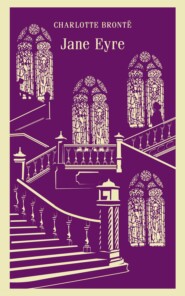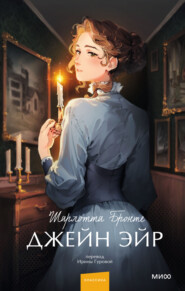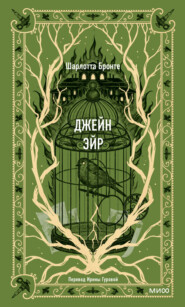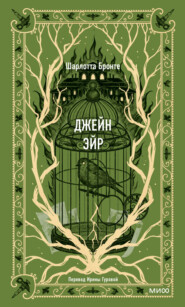По всем вопросам обращайтесь на: info@litportal.ru
(©) 2003-2024.
✖
Villette
Настройки чтения
Размер шрифта
Высота строк
Поля
Yet, to speak the truth, never had I been less dissatisfied with her than I was then. There was pleasure in thinking of the contrast between the reality and my description – to remember Dr. John enjoying the drive home, eating his supper with relish, and retiring to rest with Christian composure. It was only when I saw him really unhappy that I felt really vexed with the fair, frail cause of his suffering.
* * * * *
A fortnight passed; I was getting once more inured to the harness of school, and lapsing from the passionate pain of change to the palsy of custom. One afternoon, in crossing the carré, on my way to the first classe, where I was expected to assist at a lesson of "style and literature," I saw, standing by one of the long and large windows, Rosine, the portress. Her attitude, as usual, was quite nonchalante. She always "stood at ease;" one of her hands rested in her apron-pocket, the other at this moment held to her eyes a letter, whereof Mademoiselle coolly perused the address, and deliberately studied the seal.
A letter! The shape of a letter similar to that had haunted my brain in its very core for seven days past. I had dreamed of a letter last night. Strong magnetism drew me to that letter now; yet, whether I should have ventured to demand of Rosine so much as a glance at that white envelope, with the spot of red wax in the middle, I know not. No; I think I should have sneaked past in terror of a rebuff from Disappointment: my heart throbbed now as if I already heard the tramp of her approach. Nervous mistake! It was the rapid step of the Professor of Literature measuring the corridor. I fled before him. Could I but be seated quietly at my desk before his arrival, with the class under my orders all in disciplined readiness, he would, perhaps, exempt me from notice; but, if caught lingering in the carré, I should be sure to come in for a special harangue. I had time to get seated, to enforce perfect silence, to take out my work, and to commence it amidst the profoundest and best trained hush, ere M. Emanuel entered with his vehement burst of latch and panel, and his deep, redundant bow, prophetic of choler.
As usual he broke upon us like a clap of thunder; but instead of flashing lightning-wise from the door to the estrade, his career halted midway at my desk. Setting his face towards me and the window, his back to the pupils and the room, he gave me a look – such a look as might have licensed me to stand straight up and demand what he meant – a look of scowling distrust.
"Voilà! pour vous," said he, drawing his hand from his waist-coat, and placing on my desk a letter – the very letter I had seen in Rosine's hand – the letter whose face of enamelled white and single Cyclop's-eye of vermilion-red had printed themselves so clear and perfect on the retina of an inward vision. I knew it, I felt it to be the letter of my hope, the fruition of my wish, the release from my doubt, the ransom from my terror. This letter M. Paul, with his unwarrantably interfering habits, had taken from the portress, and now delivered it himself.
I might have been angry, but had not a second for the sensation. Yes: I held in my hand not a slight note, but an envelope, which must, at least, contain a sheet: it felt not flimsy, but firm, substantial, satisfying. And here was the direction, "Miss Lucy Snowe," in a clean, clear, equal, decided hand; and here was the seal, round, full, deftly dropped by untremulous fingers, stamped with the well-cut impress of initials, "J. G. B." I experienced a happy feeling – a glad emotion which went warm to my heart, and ran lively through all my veins. For once a hope was realized. I held in my hand a morsel of real solid joy: not a dream, not an image of the brain, not one of those shadowy chances imagination pictures, and on which humanity starves but cannot live; not a mess of that manna I drearily eulogized awhile ago – which, indeed, at first melts on the lips with an unspeakable and preternatural sweetness, but which, in the end, our souls full surely loathe; longing deliriously for natural and earth-grown food, wildly praying Heaven's Spirits to reclaim their own spirit-dew and essence – an aliment divine, but for mortals deadly. It was neither sweet hail nor small coriander-seed – neither slight wafer, nor luscious honey, I had lighted on; it was the wild, savoury mess of the hunter, nourishing and salubrious meat, forest-fed or desert-reared, fresh, healthful, and life-sustaining. It was what the old dying patriarch demanded of his son Esau, promising in requital the blessing of his last breath. It was a godsend; and I inwardly thanked the God who had vouchsafed it. Outwardly I only thanked man, crying, "Thank you, thank you, Monsieur!"
Monsieur curled his lip, gave me a vicious glance of the eye, and strode to his estrade. M. Paul was not at all a good little man, though he had good points.
Did I read my letter there and then? Did I consume the venison at once and with haste, as if Esau's shaft flew every day?
I knew better. The cover with its address – the seal, with its three clear letters – was bounty and abundance for the present. I stole from the room, I procured the key of the great dormitory, which was kept locked by day. I went to my bureau; with a sort of haste and trembling lest Madame should creep up-stairs and spy me, I opened a drawer, unlocked a box, and took out a case, and – having feasted my eyes with one more look, and approached the seal with a mixture of awe and shame and delight, to my lips – I folded the untasted treasure, yet all fair and inviolate, in silver paper, committed it to the case, shut up box and drawer, reclosed, relocked the dormitory, and returned to class, feeling as if fairy tales were true, and fairy gifts no dream. Strange, sweet insanity! And this letter, the source of my joy, I had not yet read: did not yet know the number of its lines.
When I re-entered the schoolroom, behold M. Paul raging like a pestilence! Some pupil had not spoken audibly or distinctly enough to suit his ear and taste, and now she and others were weeping, and he was raving from his estrade, almost livid. Curious to mention, as I appeared, he fell on me.
"Was I the mistress of these girls? Did I profess to teach them the conduct befitting ladies? – and did I permit and, he doubted not, encourage them to strangle their mother-tongue in their throats, to mince and mash it between their teeth, as if they had some base cause to be ashamed of the words they uttered? Was this modesty? He knew better. It was a vile pseudo sentiment – the offspring or the forerunner of evil. Rather than submit to this mopping and mowing, this mincing and grimacing, this, grinding of a noble tongue, this general affectation and sickening stubbornness of the pupils of the first class, he would throw them up for a set of insupportable petites maîtresses, and confine himself to teaching the ABC to the babies of the third division."
What could I say to all this? Really nothing; and I hoped he would allow me to be silent. The storm recommenced.
"Every answer to his queries was then refused? It seemed to be considered in that place – that conceited boudoir of a first classe, with its pretentious book-cases, its green-baized desks, its rubbish of flower-stands, its trash of framed pictures and maps, and its foreign surveillante, forsooth! – it seemed to be the fashion to think there that the Professor of Literature was not worthy of a reply! These were new ideas; imported, he did not doubt, straight from 'la Grande Bretagne:' they savoured of island insolence and arrogance."
Lull the second – the girls, not one of whom was ever known to weep a tear for the rebukes of any other master, now all melting like snow-statues before the intemperate heat of M. Emanuel: I not yet much shaken, sitting down, and venturing to resume my work.
Something – either in my continued silence or in the movement of my hand, stitching – transported M. Emanuel beyond the last boundary of patience; he actually sprang from his estrade. The stove stood near my desk, he attacked it; the little iron door was nearly dashed from its hinges, the fuel was made to fly.
"Est-ce que vous avez l'intention de m'insulter?" said he to me, in a low, furious voice, as he thus outraged, under pretence of arranging the fire.
It was time to soothe him a little if possible.
"Mais, Monsieur," said I, "I would not insult you for the world. I remember too well that you once said we should be friends."
I did not intend my voice to falter, but it did: more, I think, through the agitation of late delight than in any spasm of present fear. Still there certainly was something in M. Paul's anger – a kind of passion of emotion – that specially tended to draw tears. I was not unhappy, nor much afraid, yet I wept.
"Allons, allons!" said he presently, looking round and seeing the deluge universal. "Decidedly I am a monster and a ruffian. I have only one pocket-handkerchief," he added, "but if I had twenty, I would offer you each one. Your teacher shall be your representative. Here, Miss Lucy."
And he took forth and held out to me a clean silk handkerchief. Now a person who did not know M. Paul, who was unused to him and his impulses, would naturally have bungled at this offer – declined accepting the same – et cetera. But I too plainly felt this would never do: the slightest hesitation would have been fatal to the incipient treaty of peace. I rose and met the handkerchief half-way, received it with decorum, wiped therewith my eyes, and, resuming my seat, and retaining the flag of truce in my hand and on my lap, took especial care during the remainder of the lesson to touch neither needle nor thimble, scissors nor muslin. Many a jealous glance did M. Paul cast at these implements; he hated them mortally, considering sewing a source of distraction from the attention due to himself. A very eloquent lesson he gave, and very kind and friendly was he to the close. Ere he had done, the clouds were dispersed and the sun shining out – tears were exchanged for smiles.
In quitting the room he paused once more at my desk.
"And your letter?" said he, this time not quite fiercely.
"I have not yet read it, Monsieur."
"Ah! it is too good to read at once; you save it, as, when I was a boy, I used to save a peach whose bloom was very ripe?"
The guess came so near the truth, I could not prevent a suddenly-rising warmth in my face from revealing as much.
"You promise yourself a pleasant moment," said he, "in reading that letter; you will open it when alone – n'est-ce pas? Ah! a smile answers. Well, well! one should not be too harsh; 'la jeunesse n'a qu'un temps.'"
"Monsieur, Monsieur!" I cried, or rather whispered after him, as he turned to go, "do not leave me under a mistake. This is merely a friend's letter. Without reading it, I can vouch for that."
"Je conçois, je conçois: on sait ce que c'est qu'un ami. Bonjour, Mademoiselle!"
"But, Monsieur, here is your handkerchief."
"Keep it, keep it, till the letter is read, then bring it me; I shall read the billet's tenor in your eyes."
When he was gone, the pupils having already poured out of the schoolroom into the berceau, and thence into the garden and court to take their customary recreation before the five-o'clock dinner, I stood a moment thinking, and absently twisting the handkerchief round my arm. For some reason – gladdened, I think, by a sudden return of the golden glimmer of childhood, roused by an unwonted renewal of its buoyancy, made merry by the liberty of the closing hour, and, above all, solaced at heart by the joyous consciousness of that treasure in the case, box, drawer up-stairs, – I fell to playing with the handkerchief as if it were a ball, casting it into the air and catching it – as it fell. The game was stopped by another hand than mine – a hand emerging from a paletôt-sleeve and stretched over my shoulder; it caught the extemporised plaything and bore it away with these sullen words:
"Je vois bien que vous vous moquez de moi et de mes effets."
Really that little man was dreadful: a mere sprite of caprice and, ubiquity: one never knew either his whim or his whereabout.
CHAPTER XXII.
THE LETTER
When all was still in the house; when dinner was over and the noisy recreation-hour past; when darkness had set in, and the quiet lamp of study was lit in the refectory; when the externes were gone home, the clashing door and clamorous bell hushed for the evening; when Madame was safely settled in the salle-à-manger in company with her mother and some friends; I then glided to the kitchen, begged a bougie for one half-hour for a particular occasion, found acceptance of my petition at the hands of my friend Goton, who answered, "Mais certainement, chou-chou, vous en aurez deux, si vous voulez;" and, light in hand, I mounted noiseless to the dormitory.
Great was my chagrin to find in that apartment a pupil gone to bed indisposed, – greater when I recognised, amid the muslin nightcap borders, the "figure chiffonnée" of Mistress Ginevra Fanshawe; supine at this moment, it is true – but certain to wake and overwhelm me with chatter when the interruption would be least acceptable: indeed, as I watched her, a slight twinkling of the eyelids warned me that the present appearance of repose might be but a ruse, assumed to cover sly vigilance over "Timon's" movements; she was not to be trusted. And I had so wished to be alone, just to read my precious letter in peace.
Well, I must go to the classes. Having sought and found my prize in its casket, I descended. Ill-luck pursued me. The classes were undergoing sweeping and purification by candle-light, according to hebdomadal custom: benches were piled on desks, the air was dim with dust, damp coffee-grounds (used by Labassecourien housemaids instead of tea-leaves) darkened the floor; all was hopeless confusion. Baffled, but not beaten, I withdrew, bent as resolutely as ever on finding solitude somewhere.
Taking a key whereof I knew the repository, I mounted three staircases in succession, reached a dark, narrow, silent landing, opened a worm-eaten door, and dived into the deep, black, cold garret. Here none would follow me – none interrupt – not Madame herself. I shut the garret-door; I placed my light on a doddered and mouldy chest of drawers; I put on a shawl, for the air was ice-cold; I took my letter; trembling with sweet impatience, I broke its seal.
"Will it be long – will it be short?" thought I, passing my hand across my eyes to dissipate the silvery dimness of a suave, south-wind shower.
It was long.
"Will it be cool? – will it be kind?"
It was kind.
To my checked, bridled, disciplined expectation, it seemed very kind: to my longing and famished thought it seemed, perhaps, kinder than it was.
So little had I hoped, so much had I feared; there was a fulness of delight in this taste of fruition – such, perhaps, as many a human being passes through life without ever knowing. The poor English teacher in the frosty garret, reading by a dim candle guttering in the wintry air, a letter simply good-natured – nothing more; though that good-nature then seemed to me godlike – was happier than most queens in palaces.
Of course, happiness of such shallow origin could be but brief; yet, while it lasted it was genuine and exquisite: a bubble – but a sweet bubble – of real honey-dew. Dr. John had written to me at length; he had written to me with pleasure; he had written with benignant mood, dwelling with sunny satisfaction on scenes that had passed before his eyes and mine, – on places we had visited together – on conversations we had held – on all the little subject-matter, in short, of the last few halcyon weeks. But the cordial core of the delight was, a conviction the blithe, genial language generously imparted, that it had been poured out not merely to content me– but to gratify himself. A gratification he might never more desire, never more seek – an hypothesis in every point of view approaching the certain; but that concerned the future. This present moment had no pain, no blot, no want; full, pure, perfect, it deeply blessed me. A passing seraph seemed to have rested beside me, leaned towards my heart, and reposed on its throb a softening, cooling, healing, hallowing wing. Dr. John, you pained me afterwards: forgiven be every ill – freely forgiven – for the sake of that one dear remembered good!
Are there wicked things, not human, which envy human bliss? Are there evil influences haunting the air, and poisoning it for man? What was near me?
Something in that vast solitary garret sounded strangely. Most surely and certainly I heard, as it seemed, a stealthy foot on that floor: a sort of gliding out from the direction of the black recess haunted by the malefactor cloaks. I turned: my light was dim; the room was long – but as I live! I saw in the middle of that ghostly chamber a figure all black and white; the skirts straight, narrow, black; the head bandaged, veiled, white.

















